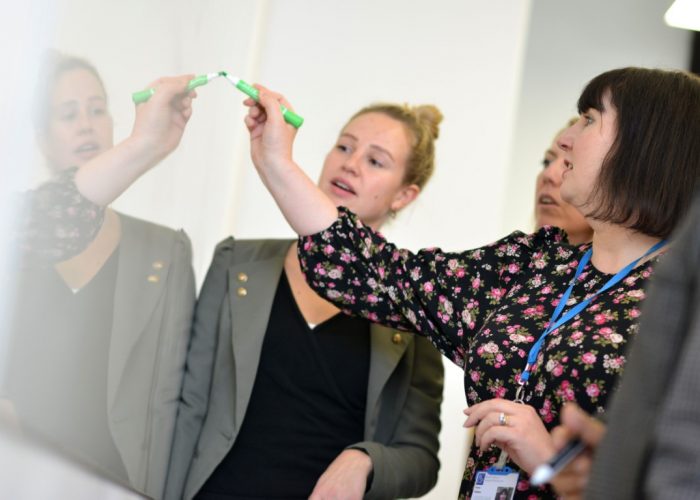 Health economist Dhivya Subramaniam, explains how artificial intelligence, AI, can help us deliver health services.
Health economist Dhivya Subramaniam, explains how artificial intelligence, AI, can help us deliver health services.
In a previous blog on predictive analytics, I explored how we can use AI to help us better plan health services. Another area we’re looking at is how AI can also help us actually deliver services.
Explained at a basic level, artificial intelligence is software that is capable of analysing data to identify patterns – and therefore risks and opportunities – and that is also capable of learning and improving its output over time or adapting to new instructions.
While a computer will never replace a care giver, we can train them to follow algorithms in just the same way as some healthcare staff do now – for example, working on switchboards, triaging phone calls and managing contacts in a similar way to NHS 111 call handlers.
The central principle of ‘intelligence’ arises from the concept of a feedback loop, in which a stimulus is processed by the brain, which then produces a reaction. ‘Intelligence’ is the ability to synthesise the incoming information from various stimuli and influence the resulting reaction through a conscious decision-making process.
The aim of AI in healthcare is not to take over this process, but to assist it – augmenting our ability to provide a high value service.
At a conference I attended earlier this year at the Royal Society of Medicine, I learned about some of the other possible applications of AI , including the feasibility of introducing chatbots on switchboards. Working in a similar way to the Alexa home device that many people will recognise, the chatbots would be able to answer telephone calls and either answer questions or take people through a number of options. The chatbots can be given initial training based on previous patterns of calls and then they keep on learning so that every time they have an interaction the algorithm is automatically fine-tuned based on what they learn from it. Of course, they would also be trained to hand the call over to a human handler if necessary – for example if the responses they were receiving didn’t match the algorithm or if they picked up any issues flagged for escalation.
By taking away some of the more straightforward switchboard work, such as simply putting calls through to departments or giving information such as visiting times, the chatbots could free up patient, visitor and clinician time by preventing callers from being placed on hold. They would also allow the switchboard staff to focus on roles and activities that are of better value to the health service, giving them more time to spend on handling complex calls or on other roles such as co-ordinating multi-disciplinary teams.
Another application of AI would be its use as a decision support tool. In my previous job as an NHS doctor, I spent a huge chunk of my time poring through clinical notes, imaging, blood results and observation charts (each of which is usually hosted on a different platform) to understand a patient’s journey and their list of health issues before a diagnosis and management plan could be made. This process is not only lengthy, but also extremely susceptible to human error. Decision support tools will be able to present this information in an easily digestible format to clinicians, allowing them to focus on the task at hand: helping their patients. It is important to note that the clinicians remain irreplaceable and in control of the decision-making process in treating patients. This is of tremendous value in a system that is under significant time pressure with a dwindling workforce.
It may seem like a completely new way of working, but many financial services and the law sector already use AI, and there’s already a huge amount of learning available that we can use to successfully introduce AI into healthcare.
As a member of an academic health science network, ICHP has partners that are already working with these systems. This means that if, for example, there is an innovation such as a chatbot that a hospital is keen on adopting, we can speak to external providers working in that area who can deliver that new service, and our innovation team can then help the hospital team adopt the service, implementing it in a seamless way with minimal disruption. In my role within the business intelligence team at ICHP, I will then evaluate these services using real-world evidence to prove their value.
Supporting such IT-based innovation is important to ICHP. Through our links into the health service and the support of our partners, we can help new enterprises that have a great idea to evaluate the effectiveness of their innovation, access the funding they need and help them get their products into the NHS. For example, we’re affiliated to digitalhealth.london, a programme aiming to speed up the development and scaling of digital innovations across health and care, helping companies navigate the UK health environment. We also work with NHS organisations to help them get the most out of the new opportunities that technology is offering.
Technology is developing faster than ever before and with these links and opportunities ICHP can be at the forefront of healthcare innovation. These are very exciting times.



